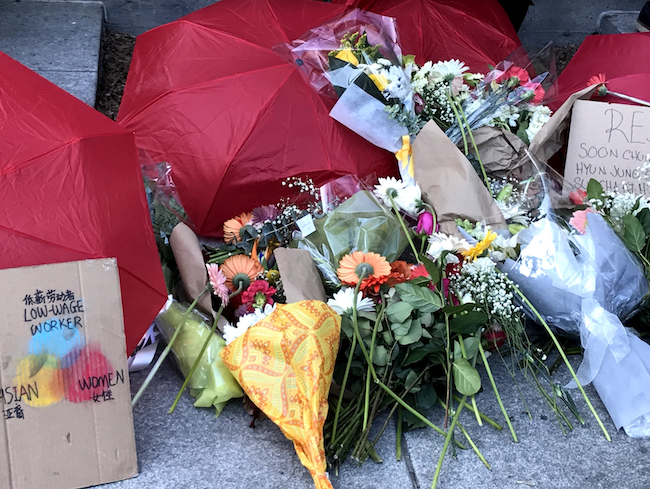Content warning: Anti-Asian racism and gendered violence.
In a year wracked with pain and bigotry, Asian communities across the diaspora contend with yet more collective grief. On March 16, gunman Richard Long opened fire in three Asian massage parlours in the Atlanta area and killed eight people—Xiaojie Tan, Daoyou Feng, Soon Chung Park, Hyeon Jeong Kim, Delaina Ashley Yaun Gonzalez, Paul Andre Michael, Sun Cha Kim and Yong Ae Yue—the majority of whom were Asian women. Cherokee County sheriff Jay Baker claimed that Long’s killing spree was driven by his sex addiction, not by racial motivations, and rebuttles to this claim by Asian communities have largely focussed on how this narrative ignores endemic anti-Asian racism. The truth, however, is more complex: The shooting equally concerns anti-Asian racism and violence against sex workers. Identifying the tragedy as a stark act of anti-Asian misogyny is crucial to healing, as any other reductive rhetoric only endorses further violence against Asian women and migrant sex workers.
In the immediate aftermath of the shooting, it would be simple to label the tragedy as the tragic capstone of the slow, insidious ramping up of anti-Asian hate in the United States and Canada since the onset of COVID-19. Yet it is documented that anti-Asian hate was endemic before the proliferation of racist, COVID-19 related rhetoric. Further, framing the shooting as being purely racially motivated completely ignores how gender, sex work, migrant status, and class factor into this violence.
In Canada, Asian women are especially at risk of violence; women made up 70 per cent of reported anti-Asian hate crimes in British Columbia in 2020. Further, the unjust portrayal of Asian women by imperialists as submissive “china dolls” has stripped them of their sexual agency and put them at greater risk of sexual violence. This fetishization of Asian women has encouraged entire industries—including websites that boast Asian models and sex dolls tailored to resemble East Asian women—to cater to “yellow fever.” It is no coincidence, then, that Long targeted Asian massage parlours.
Massage parlours, predominantly staffed by Asian and migrant sex workers, have long borne the brunt of violence: In 2017, massage worker Yang Song was killed by police in Flushing, NYC, and Ashley Noell Arzaga was murdered last May in North York. According to Butterfly Network, 12 per cent of Asian and migrant parlour workers experienced physical or sexual assault by law enforcement in 2018. Acknowledging that the victims worked in, or frequented, massage parlours is crucial, as there is a stigma within Asian communities that dehumanizes massage parlour workers due to the erotic nature of their work. Whether they explicitly identified as sex workers or not is irrelevant: Their deaths stem from the proliferation of innate whorephobia and the same racism that fetishizes Asian women, and reduces them to commodities.
Addressing the shooting as a one-note, pan-Asian problem fails to consider the stark misogyny and classism that exists within Asian diaspora communities; recently, many East Asian communities in North America have embraced far-right politics that are xenophobic and pro-police. This rise in conservatism, coupled with the pre-existing stigmas around sex work, ostracizes sex workers from larger Asian communities. Likewise, the unsavoury “model minority” myth shames those who fail to fit the mold of financially successful Asian immigrants. Asian communities must embrace and protect sex workers, finding solidarity together instead of scapegoating them.
The danger to Asian communities goes beyond simply demeaning comments about smelly food and microaggressions in classrooms: We are losing Asian women and migrant sex workers to preventable violence. Already, the police presence in Asian communities has increased since the shooting; in the past year, the SPVM increased their patrols in Montreal’s Chinatown, however, this decision protects only a select few business owners. Increasing policing is a misguided decision that will only further endanger sex workers and undocumented migrants. Decriminalizing sex work is necessary and will protect not only Asian lives, but the lives of all sex workers. Every Asian sex worker, Asian woman, and Asian immigrant is precious. We must always treat them this way.










I completely agree with this article. The safety of Asian migrant sex workers is everyone’s concern.